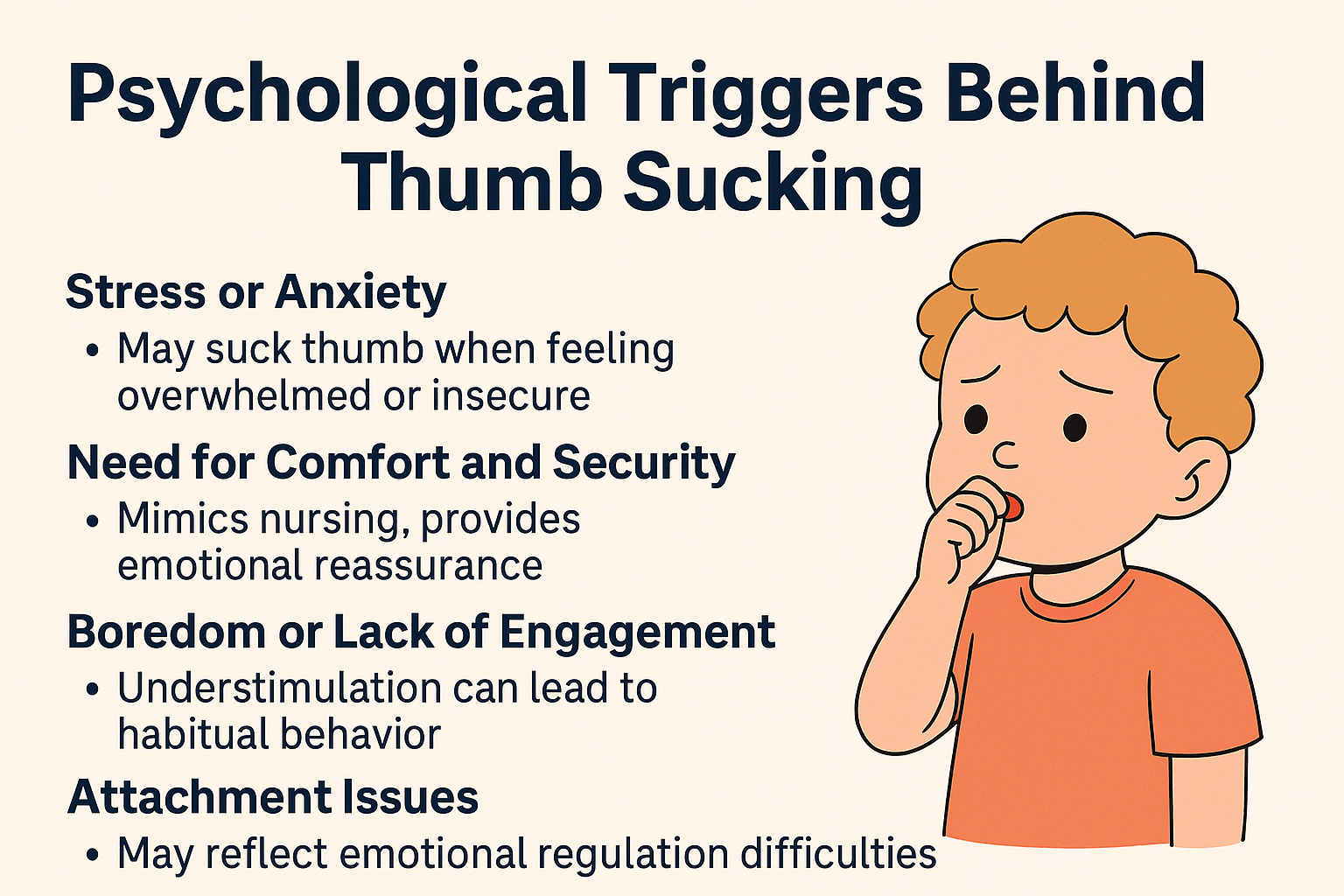
Psychological Triggers Behind Thumb Sucking in Children
Thumb sucking is one of the most common habits observed in infants and young children. While it may seem harmless at first, persistent thumb sucking—especially beyond the toddler years—can be linked to deeper psychological triggers and emotional needs. Understanding the reasons behind this behavior is essential for parents, caregivers, and pediatric dentists.
🧠 Why Do Children Suck Their Thumbs?
Thumb sucking is a natural reflex that starts even in the womb. It’s soothing, calming, and often helps babies fall asleep or self-regulate. However, when it continues into preschool and school age, it may be driven more by emotional or psychological factors than just habit.
🧩 Common Psychological Triggers Behind Thumb Sucking
- Stress or Anxiety
- Children may suck their thumbs when they feel overwhelmed, scared, or insecure.
- It becomes a coping mechanism to deal with uncomfortable emotions.
- Common triggers: school pressure, separation anxiety, family tension, or fear of the unknown.
- Need for Comfort and Security
- Thumb sucking mimics the comfort of nursing or bottle-feeding.
- It’s often seen in children who need emotional reassurance, especially during transitions like weaning, moving homes, or a new sibling.
- Boredom or Lack of Engagement
- Some children suck their thumbs when they are understimulated or bored.
- It becomes a habitual behavior to pass time or self-entertain.
- Attachment Issues
- Children with insecure attachment to caregivers may rely on self-soothing more heavily.
- Thumb sucking becomes their way of emotionally regulating in the absence of responsive caregiving.
- Imitation and Learned Behavior
- If peers, siblings, or parents engaged in similar habits, children may mirror the behavior.
- It could also be reinforced if adults react dramatically to the habit.
- Sleep Association
- Some children associate thumb sucking with falling asleep.
- It becomes a part of their bedtime routine, acting like a pacifier.
👶 When to Worry About Thumb Sucking
- Habit persists beyond age 4–5.
- Sucking is aggressive or frequent, even during active play.
- Leads to dental issues, such as misaligned teeth or bite problems.
- Causes speech delays or tongue-thrusting patterns.
- Associated with social withdrawal or increased anxiety.
🦷 Impact on Oral Health and Development
- Prolonged thumb sucking can lead to:
- Open bite or overbite.
- Narrowing of dental arches.
- Speech articulation issues.
- Need for orthodontic treatment later.
🧩 Understanding Emotional Patterns in Thumb Suckers
| Age | Psychological Trigger | Common Situations |
| 6 months – 1 year | Self-soothing, security | Sleep time, hunger, new environment |
| 1–3 years | Separation anxiety, boredom | Daycare, travel, parental absence |
| 3–5 years | Insecurity, fear, habit | New sibling, night-time, preschool |
| 5+ years | Emotional regulation issues | School stress, peer pressure, trauma |
💡 Tips for Parents to Address Emotional Triggers
- Avoid scolding or shaming – This may increase anxiety and worsen the behavior.
- Identify stressors – Watch for emotional triggers like major life changes.
- Offer emotional support – Be present, nurturing, and calm.
- Introduce substitute comforts – Soft toys, storytime, or calming music.
- Keep children engaged – Stimulate with games, puzzles, and creative activities.
- Use positive reinforcement – Reward days when thumb sucking is reduced.
- Consult a child psychologist – If the habit is severe or linked to trauma.
🔍 When to Seek Professional Help
- If thumb sucking is impacting the child’s confidence or social life.
- Dental changes are becoming visible or speech issues emerge.
- The child appears emotionally distressed, clingy, or withdrawn.
🧠 Psychological Therapies That Can Help
- Behavior therapy: Helps children become aware and develop alternatives.
- Play therapy: Addresses underlying emotional stress in a child-safe space.
- Parental coaching: Guides parents to foster a supportive environment.
✅ Summary
Thumb sucking is not just a harmless childhood habit—it can be a window into a child’s emotional world. By identifying psychological triggers such as anxiety, need for comfort, or boredom, parents can gently guide their child away from the habit. With patience, understanding, and the right support, children can outgrow thumb sucking in a healthy way.
FAQs
- Can thumb sucking be a sign of emotional distress in children?
Yes, chronic thumb sucking can indicate underlying stress, anxiety, or lack of emotional security. - At what age should thumb sucking be considered a concern?
If it persists beyond 4–5 years of age, especially once permanent teeth begin erupting, intervention may be needed. - Is thumb sucking linked to specific parenting styles?
Overly permissive or emotionally distant parenting can contribute to persistent self-soothing behaviors like thumb sucking. - Can thumb sucking be a habit learned from peers or siblings?
Yes, observational learning can influence such behaviors, especially in daycare or sibling environments. - Are there personality traits associated with thumb suckers?
Children who are shy, introverted, or sensitive may rely more on self-soothing habits like thumb sucking. - How does attachment theory relate to thumb sucking?
Children with insecure attachment may develop thumb sucking as a substitute for parental comfort and security. - Can thumb sucking be linked to nighttime fears or sleep disorders?
Yes, it may serve as a coping mechanism for nightmares, sleep anxiety, or nighttime separation. - What role does screen time play in increasing thumb sucking behavior?
Excessive screen time may delay emotional regulation, increasing dependency on self-soothing behaviors. - Are children with ADHD more prone to thumb sucking?
Yes, due to impulsivity, sensory-seeking behaviors, and difficulty self-regulating, children with ADHD may thumb suck more. - Can pacifier use delay or reduce thumb sucking behavior?
Temporarily, yes — but long-term use of pacifiers can also lead to dependency and dental issues.
🔖 Call to Action
Explore our Children’s Oral Health Care Products to support your child’s journey to a healthy smile.
Related Reads
Oral Parafunctional Habits and ADHD in Children: Understanding the Link
